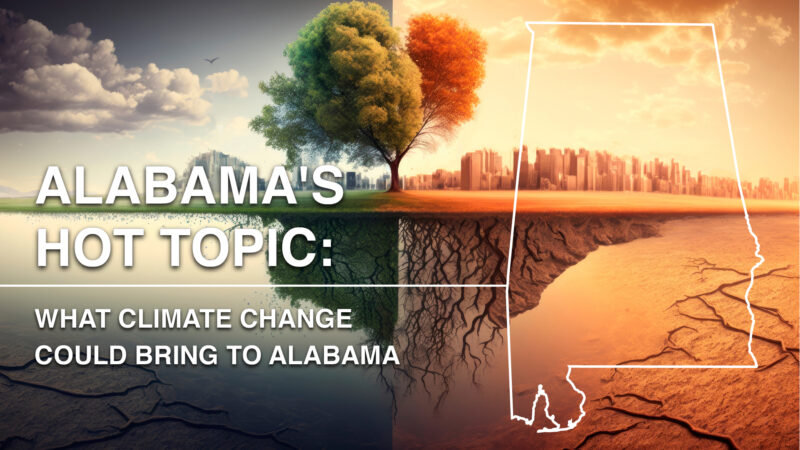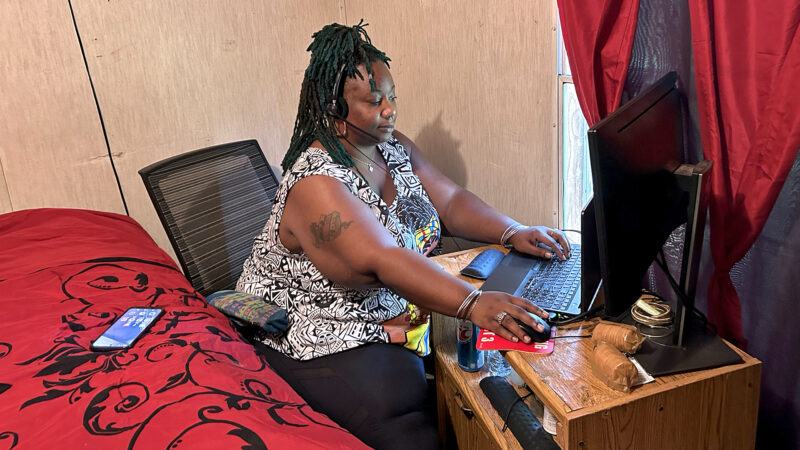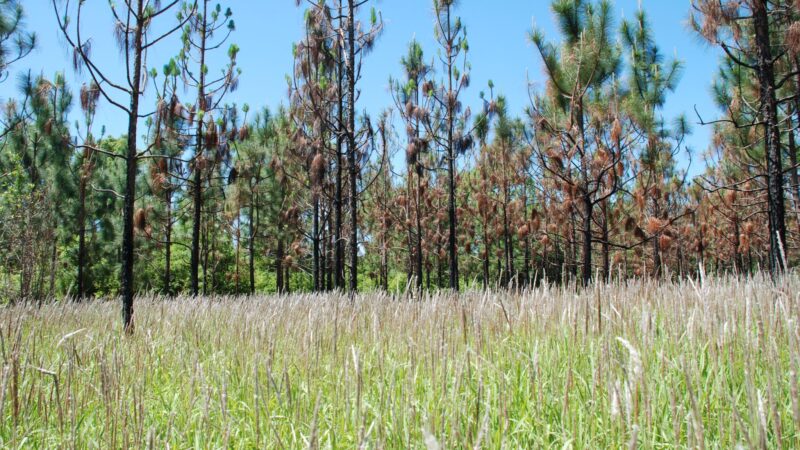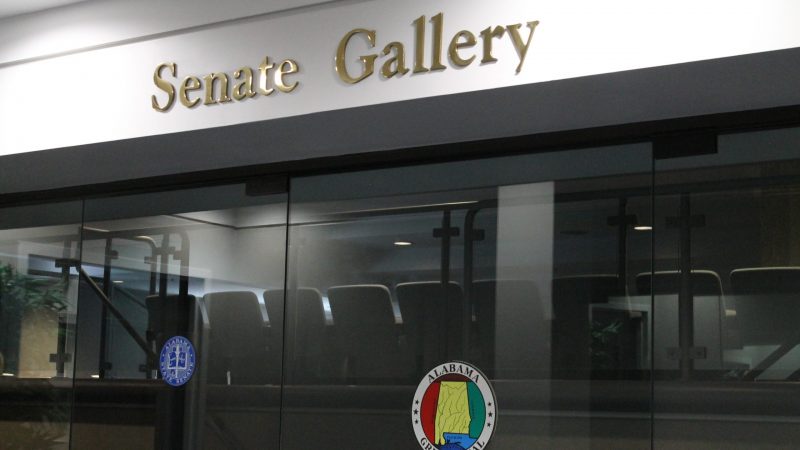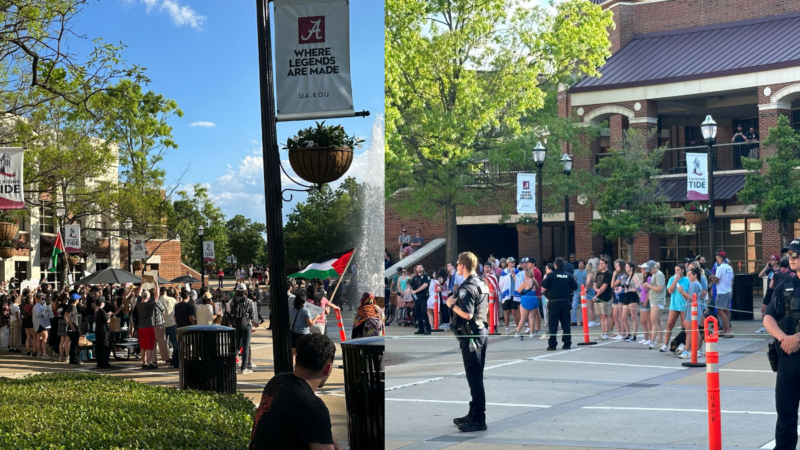The connection is growing between climate change and big storms
This story is part of a series “Alabama’s Hot Topic: What Climate Change Could Bring.” Read additional stories in the series.
On January 12, 2023, Selma took a direct hit from a tornado. Aaron Roper was at work that morning.
“It went from being just a nice, warm day,” he said. “Then all of a sudden, it seems like dark clouds just began to transition into our area.”
Along with several coworkers, Roper took cover in an interior room in his office while the storm pummeled the area around him. He then got word his house had been hit and headed home to check on his wife and child.
“Three-quarters of the roof was gone, and so I immediately walked in the house, checked on everybody,” he said.
Roper said his wife and child were physically OK, but they were shocked.
“Quite frankly, everybody was shaken up,” he continued. “Because being at home during something like that — not that you don’t take it serious — but you just don’t think it’s going to happen to you. And when it gets you, you’re shaking, you’re frantic.”
Amazingly, no one in the city was killed, but with winds clocked at 130 mph, the EF2 twister destroyed homes, churches, businesses, and just about everything else in its path.
A tenuous connection to twisters
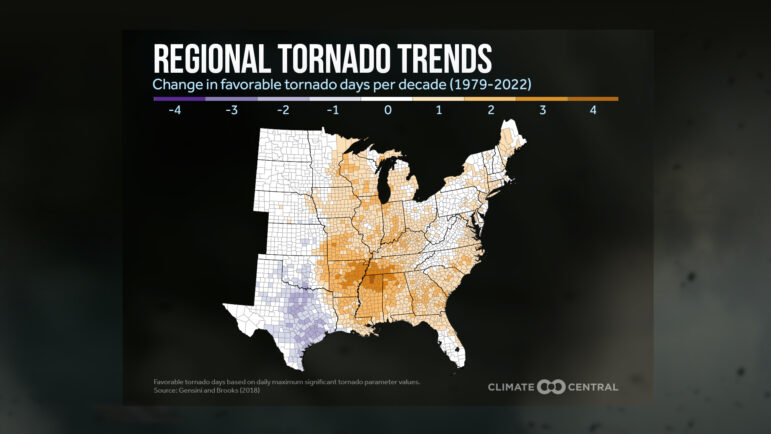
There was a time when severe storms, like the one that hit Selma this winter, were the exception. Now tornado outbreaks from November to February are happening here in the South more frequently. Winter provides increasingly favorable conditions for tornadoes in the Southeast.
According to Harold Brooks, a senior research scientist at the National Severe Storms Laboratory, sea surface temperatures across the Gulf of Mexico are increasing, helping generate the warm, humid surface air that feeds severe thunderstorms across the central and eastern U.S. That warm air is, in effect, the missing link that makes conditions in winter favorable to the formation of tornadoes.
“The change of the wind with height that helps organize storms — that makes them more likely to rotate in a way that produces a tornado. That maximizes in the wintertime,” he said.
Brooks noted that the number of tornadoes has increased by about 10% in the Southeast since the 1980s. But he emphasized researchers have not yet connected these changes to climate change.
“The presence of greenhouse gases in the atmosphere leads to the warming of the planet, and we’re seeing changes in the global temperature that are happening faster than we’ve seen in the in the geologic record. The issue with severe thunderstorms is that the connection isn’t completely straightforward,” Brooks said. “We’re not really sure if it’s climate change. There’s a good chance that it is, but it’s really difficult to make the chain complete from the planet warming to the change in tornado occurrence that we’ve observed.”
Hurricanes and climate change
When it comes to hurricanes, the connection is a little more straightforward. Climate change is causing sea levels to rise, through ice sheets and glaciers melting, plus warmer seawater expands.
A report released this spring by an international team of researchers out of Tulane University shows that sea levels along the Gulf and Southeast coasts have risen by about half an inch per year since 2010. That’s about three times more than the global average.
Brian Dzwonkowski is a professor at the University of South Alabama and a senior marine scientist at the Dauphin Island Sea Lab. He said those few extra inches can be critical.
“If you’re in a storm surge situation where you have a hurricane coming ashore and there’s high water levels from the storm surge, that may make the difference between a house flooding and a house not flooding,” Dzwonkowski said.
Sea surface temperatures hit record highs this year and are expected to warm even more by this fall. Dzwonkowski pointed out that warm waters are a big factor in fueling hurricanes, just like they are with land-based storms.
“The warmer the ocean gets, the more energy hurricanes can pull out of the ocean,” he said. “And so a warming ocean means more powerful storms.”
Warmer waters, like those of the Gulf, also feed more moisture to storms, leading to more rainfall, especially when hurricanes make landfall and stall. Plus those balmy waters can cause storms to rapidly intensify, causing them to be even more destructive, like what happened with three recent hurricanes: Sally, Michael, and Ian.
“I think there’s a lot of question marks there about how livable the coastal environments going to be over the next 30 to 40 years,” Dzwonkowski said.
Both Dzwonkowski and Brooks emphasized while changes in hurricanes and tornadoes can’t be definitively tied to human-caused climate change, the data is beginning to show a connection that needs to be taken seriously.
Q&A: Bobby Carter on leading Tiny Desk, his time at Jackson State, early career advice
Carter, a Jackson State alumnus, took over as the new series host and producer for NPR’s “Tiny Desk Concerts” series in April.
Alabama to begin working with a consulting company that’s under criminal investigation
McKinsey & Company, an international consulting business, will help the state of Alabama develop a new strategic economic growth plan. The company is undertaking that project, while also dealing with a probe into whether it engaged in a criminal conspiracy.
‘Stupidity of politics’: Medicaid expansion effort dies in Mississippi
Mississippi lawmakers couldn’t come together to pass a bill that could have expanded Medicaid for thousands of residents.
This spiky-stemmed invasive grass is taking over Alabama
Classified as one of the worst weeds in the world, cogongrass aggressively crowds out native species and costs Alabama landowners tens of millions of dollars in lost revenue.
Gambling bill in doubt with three days left in the legislative session
Alabama lawmakers are coming down to the finish line for this year’s legislative session. Many bills await passage, but perhaps the biggest one up in the air is a lottery and gambling bill.
Pro-Palestinian demonstration draws counter-protest at University of Alabama
Students gathered demanding the school call for a permanent and immediate ceasefire and to push the school to sever ties with defense contractor Lockheed Martin.
